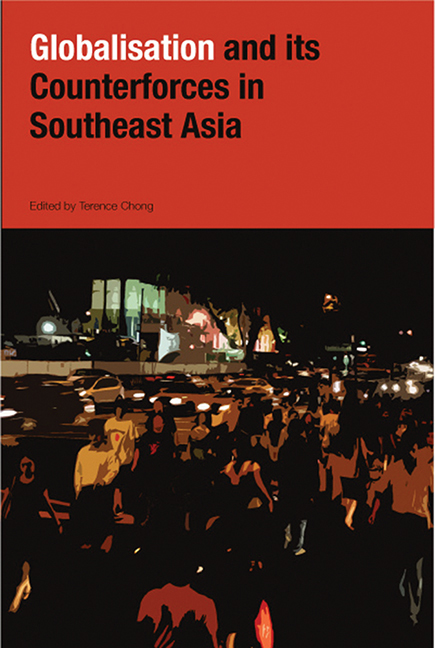Book contents
- Frontmatter
- Contents
- Foreword
- Preface
- The Contributors
- Introduction
- Part I The Political Contradictions of Globalization
- Part II Economic Regionalism and Global Influences
- Part III Local Security, Global Insecurity
- Part IV Social Processes: Arrested Development
- Part V Cultural Production in the Global Matrix
- Index
Preface
Published online by Cambridge University Press: 21 October 2015
- Frontmatter
- Contents
- Foreword
- Preface
- The Contributors
- Introduction
- Part I The Political Contradictions of Globalization
- Part II Economic Regionalism and Global Influences
- Part III Local Security, Global Insecurity
- Part IV Social Processes: Arrested Development
- Part V Cultural Production in the Global Matrix
- Index
Summary
This book is the product of two different workshops on globalization in Southeast Asia held at the Institute of Southeast Asian Studies (ISEAS). The first was jointly organized by ISEAS and the Swedish School of Advanced Asia-Pacific Studies (SSAAPS). Entitled “Globalization and its Counterforces”, the workshop took place from 23–27 February 2004, and was generously funded by SSAAPS. Eleven of the sixteen chapters in this book were from papers presented at this workshop.
The second workshop, entitled “Cultural Globalization in Southeast Asia”, an ISEAS initiative, took place a year later on 8 June 2005. Funded by ISEAS, the workshop looked at the social and cultural dimensions of globalization and contributes five chapters to this book.
Although the two workshops were conceived and executed a year apart, the rationale for combining selected papers from both workshops quickly become apparent. The first workshop dealt principally with the political and security issues of globalization, while the second investigated its social and cultural dimensions. By placing the intellectual endeavours and original research of the different scholars side by side, it was possible to present a holistic picture of globalization and its consequences in the region. Hence, instead of working towards two separate publications, it was decided that publishing papers reflecting the political, economic, security, social, and cultural dimensions of globalization all in one volume offered the reader a more complex interpretation of globalization.
While the workshops sought to cover the region as comprehensively as possible, no papers on Brunei were presented for lack of appropriate scholarship. Furthermore, newer ASEAN countries like Vietnam, Laos, Cambodia and Myanmar are not discussed in separate chapters but studied as a collective.
As with any project, this book and its preceding workshops would not have been possible without the help of many people. I would like to thank all the chapter contributors for their insightful and stimulating contribution, not to mention their patience as this book underwent the editorial process.
The support and encouragement of Mr K. Kesavapany, Director of ISEAS, was instrumental in executing the two workshops and this book. ISEAS Deputy Director Dr Chin Kin Wah also offered sound advice and encouragement.
- Type
- Chapter
- Information
- Publisher: ISEAS–Yusof Ishak InstitutePrint publication year: 2008

